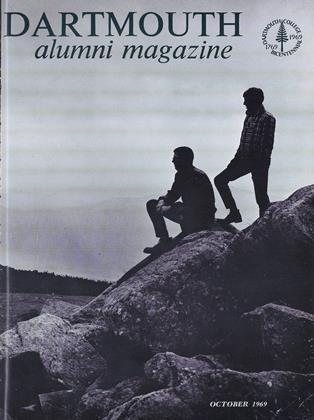FROM across the nation to the west and the Atlantic Ocean to the east, Dartmouth College has become the recipient of several unusual gifts, keepsakes from history, as the College marks its Bicentennial Year.
They include a 19th century silver cup, a pewter cider mug, a photograph of the Britannia Royal Naval College in Dartmouth, England, a letter written by Civil War General William Tecumseh Sherman in 1869, and the forward lens from the College's first astronomical telescope that a century ago helped man inch forward in his knowledge of the solar system and space.
Dartmouth, last of the colonial colleges established in the United States, launched its 200th anniversary celebration June 14, and honored guests included the 9th Earl of Dartmouth and his wife at that ceremony in Hanover. Lord Dartmouth, a direct descendant of the British peer and statesman whose name the College took when it was chartered in 1769, presented to the College an heirloom silver cup nearly three feet high from base to the tip of its ornate spire. Named the Lord and Lady Dartmouth Bicentennial Cup by President Dickey, the cup has already been added to the College's treasured possessions.
At the same time, greetings and mementos from both the ancient town of Dartmouth, England, from which the first Lord Dartmouth's title was taken, and the Royal Naval College were also carried over the sea in June by another English well-wisher.
Basil Payne, a retired United Nations administrative officer and now the proprietor of an historic ship's chandler's shop in the English port town at the mouth of the Dart River, was "drafted" as messenger when it became known around Dartmouth, England, that he was flying to the United States to watch his son, Meyrick, receive a Master's degree from Dartmouth's Amos Tuck School.
In a hands-across-the-sea gesture, Eric Cook, major and alderman of the Royal Borough, asked Mr. Payne to bring to President Dickey a replica of a pewter mug once used by cider makers in the English town. At the same time, British Naval Captain David Williams, commandant of the Royal Naval College at Dartmouth, gave Mr. Payne a framed picture of that historic institution, the Annapolis of the Royal British Navy, to present to its namesake institution of higher learning in the United States.
Visitors to Dartmouth's Baker Library may now view the Bicentennial Cup, along with other mementos of the College's past, in special displays commemorating various phases in the College's history.
Near the reception desk, for instance, is exhibited a letter written on the eve of Dartmouth's Centennial celebration by General Sherman, whose "march to the sea" split the Confederacy during the Civil War. In the letter to Wisconsin Senator Matthew Carpenter, General Sherman apologizes for being unable to accept the Senator's invitation to ceremonies at Beloit College, explaining "I am booked for the Centennial at Dartmouth."
The letter was presented to Dartmouth by Beloit History Professor Robert H. Irrman who said he had been saving it for several years to give to Dartmouth on the occasion of its 200th anniversary.
The oldest and perhaps most unusual Bicentennial gift so far received is the forward lens from the College's first astronomical telescope. After a 98-year "sabbatical" the lens was recently returned to Dartmouth by President James A. Long of the Theosophical University, Altadena, California.
With the help of Dr. George A. Seielstad '59, a radioastronomer at the California Institute of Technology, the old lens was shipped to Prof. Allen L. King, Dartmouth physicist, who has placed it on display with other historically significant apparatus in Dartmouth's Shattuck Observatory.
According to Walter S. Adams, former director of the Mount Wilson Observatory, the lens was originally fashoned by Joseph Fraunhofer, a famous German spectroscopist and optician particularly noted for his discovery of the "dark lines" in the solar spectrum. In 1848, Dartmouth purchased the telescope from Fraunhofer's successors, G. Merz & Sons of Munich, at a cost of $2,379. Upon its arrival in New York, however, the instrument was impounded by customs officials and held for several months until Congress granted a petition to release it from near-fatal import duties of 30 per cent. When it finally reached the Hanover Plain, the telescope was installed by Professor Ira Young in a wooden housing in back of his garden. The old granite millstone which served as a base for its pier may still be found near South Massachusetts Hall.
In 1871 the College's old Merz telescope was turned in as part payment on the larger Clark instrument which is still in use today. The history of the lens between 1871 and 1904 is obscure. At some time during that period it came into the hands of Colonel Fred G. Plummer, then chief geographer for the U.S. Forest Service. In July 1904 he gave it to Katherine Tingley, president of Theosophical University, and it remained thereafter in the custody of her successors. Now it has made its way back to Dartmouth and the starless velvet of a Shattuck Observatory display case.
Facsimile of letter written by General Sherman 100 years ago.
 View Full Issue
View Full Issue
More From This Issue
-
 Feature
FeatureThird Century Fund Launches General Campaign Among Alumni
October 1969 -
 Feature
FeatureThe Transcending Great Issues
October 1969 -
 Feature
FeatureA Scientific Centennial for Dartmouth
October 1969 By ALLEN L. KING -
 Feature
FeatureWhitewater Racing Gains New Status
October 1969 By JAY EVANS '49 -
 Article
ArticleWith the Big Green Teams
October 1969 -
 Article
ArticleA Farewell Lecture
October 1969
Features
-
 Feature
FeatureFund Goal: $1,250,000
March 1962 -
 Feature
FeatureALUMNI COLLEGE 1965
JANUARY 1965 -
 Feature
FeatureTHE 200TH COMMENCEMENT
JULY 1970 -
 Feature
FeatureWISDOM OF THE GUIDES
Nov/Dec 2000 -
 Feature
Feature‘No reason... except faith' Ten Years of ABC
February 1974 By BRUCE KIMBALL -
 Feature
FeatureJourney to Budapest
Nov/Dec 2010 By CYNTHIA MARIE O'BRIEN ’04


